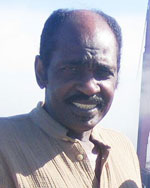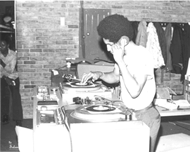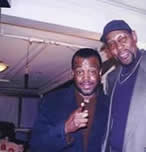You are using an out of date browser. It may not display this or other websites correctly.
You should upgrade or use an alternative browser.
You should upgrade or use an alternative browser.
A comprehensive guide to the origin/roots of HipHop's elements (all verified facts w/ OG interviews)
- Thread starter IllmaticDelta
- Start date
More options
Who Replied?K.O.N.Y
Superstar
How did the hymns get to the new yorker @IllmaticDelta
IllmaticDelta
Veteran
How did the hymns get to the new yorker @IllmaticDelta
???
K.O.N.Y
Superstar
i guess this is more so demonstration of the great migrations
IllmaticDelta
Veteran
i guess this is more so demonstration of the great migrations
Richard Allen and AME church

Good shyt
OP @IllmaticDelta never includes citations for the written excerpts he post. Odd
Wear My Dawg's Hat
Superstar
Most of the early foundational NYC rappers (DJ Hollywood, KC Prince Of Soul, Luvbug Starski, Melle mel) cite Hank Spann as their radio jock influence
Hank Spann was great for sure...the "Golden Voice." I tried hard every day in elementary school to pick up WWRL in The Bronx on my radio and it was difficult. 'RL was on the 1600 AM frequency, which was at the least powerful part of the AM dial (and non competitive with the clarity of FM, which is why music on AM died by the end of the 1970s). 'RL also had great jocks like Gary Byrd (who recorded early rap records), Enoch Gregory, Gerry Bledsoe and Bob Law (Mr. Night Talk - "I Respect You").
However, it can be argued that there wouldn't be Hip Hop - not just "rapping," or "emceeing" (the preferred term for those who grew up with it...) were it not for Frankie "The Chief Rocker" Crocker on WBLS ("The World In Black"..."The World's Best Looking Sound").
Literally the first super-gigantic rap record, "Rapper's Delight," shouts Frankie out specifically during Master Gee's final verse:
Well, like Johnny Carson on the late show
A like Frankie Crocker in stereo
A like the Bar-Kays singing "Holy Ghost"
The sounds I throw down, a they're played the most
Just a like my man, a Captain Sky
Whose name he earned with his super sperm
We rock and we don't stop
A get off, y'all, I'm here to give you whatcha got
A to the beat that it makes you freak
And come alive girl, a get on your feet
Not only was Frankie one of the most important radio personalities in the history of the industry, he was the program director who made WBLS-FM the most
listened to music radio station in the entire country.
The party scenes that developed in Hip Hop, but also the NYC non- Hip Hop club scene (which produced legend deejays like Larry Levan and Frankie Knuckles), and the non-Hip Hop R&B club scene (Leviticus, Silver Shadow, Justine's, Paradise Garage) we're all influenced by the music that Frankie played on the radio. In fact, Frankie was one of the leading party promoters in the city during the 70s. Pete DJ Jones deejayed parties for Frankie and the station.
Frankie was so legendary that he was brought to Hollywood in 1973 to make a cameo appearance with one of his "raps" in "Five On The Black Hand Side" (a criminally under appreciated classic, btw):
Of course, we can't forget that Frankie took Mr. Magic from non-commercial radio station WHBI and gave him a show on WBLS in 1982 - one of the first Hip Hop shows on a major FM radio station in the country.
Frankie Crocker's overall influence on contemporary American culture is in evidence every single day.
“The Radio Equivalent of Muhammad Ali”
Published by
NYPR Archives & Preservation
Crocker arrived in New York in the late sixties and worked at rhythm and blues powerhouse WWRL and at WMCA during that station’s waning days as a Top Forty leader. In 1971, as FM was beginning to overtake AM for music programming, he moved to WLIB-FM to serve as both program director and the afternoon drive time host. Soon WLIB-FM changed its call letters to WBLS and Crocker was developing a smoother, more sophisticated format than the machine gun pace of AM pop music radio. Crocker recruited and groomed radio newcomers Vy Higginson (the first female pop music disk jockey in New York), Fred “Bugsy” Buggs, and Ken “Spider” Webb to host what the station called “the total Black experience in sound.”² It was a format eclectic enough to mix Aretha Franklin, John Coltrane, Frank Sinatra, James Brown, Billie Holiday, Johnny Mathis, and Kool and the Gang. As BLS knocked perennial number one WABC from its ratings perch and the station’s audience grew more diverse, he introduced non-black acts like New York New Wave darlings Blondie and British punk rockers The Clash to his listeners. It was the beginning of the format that became known as Urban Contemporary.³
On the air Crocker was, as New York Daily News writer David Hinckley explained to Doane, “the radio equivalent to Muhammad Ali.” He called himself “The Chief Rocker,” “The Eighth Wonder of the World,” and “Hollywood,” and told his listeners, “If Frankie Crocker isn’t on your radio, your radio isn’t on.” As with Ali, it was up to his competitors to prove it wasn’t so.
Doane’s remembrance also discussed the importance of Crocker and other African American disk jockeys played in their communities. Howard University professor William Barlow told Doane, “The DJs were a significant player in the black community. . . A [DJ was a] civic leader. . .a mobilizer. . .a relayer of information pertaining to the community. . . black radio DJs filled a huge vacuum in terms of providing civic leadership and morale.” New York hip hop pioneer Fab 5 Freddy has talked about Crocker’s influence on his Bedford Stuyvesant neighborhood, where during the summer with the windows open you could walk down the street and hear Crocker’s show uninterrupted for blocks.
“The Radio Equivalent of Muhammad Ali” | WNYC | New York Public Radio, Podcasts, Live Streaming Radio, News
Last edited:
Hank Spann was great for sure...the "Golden Voice." I tried hard every day in elementary school to pick up WWRL in The Bronx on my radio and it was difficult. 'RL was on the 1600 AM frequency, which was at the least powerful part of the AM dial (and non competitive with the clarity of FM, which is why music on AM died by the end of the 1970s). "RL also had great jocks like Gary Byrd (who recorded early rap records), Enoch Gregory, Gerry Bledsoe and Bob Law (Mr. Night Talk - "I Respect You").
However, it can be argued that there wouldn't be Hip Hop - not just "rapping," or "emceeing" (the term for those who grew up with it...) were it not for Frankie "The Chief Rocker" Crocker on WBLS ("The World In Black"..."The World's Best Looking Sound").
Literally the first super-gigantic rap record, "Rapper's Delight," shouts Frankie out specifically during Master Gee's final verse:
Well, like Johnny Carson on the late show
A like Frankie Crocker in stereo
A like the Bar-Kays singing "Holy Ghost"
The sounds I throw down, a they're played the most
Just a like my man, a Captain Sky
Whose name he earned with his super sperm
We rock and we don't stop
A get off, y'all, I'm here to give you whatcha got
A to the beat that it makes you freak
And come alive girl, a get on your feet
Not only was Frankie one of the most important radio personalities in the history of the industry, he was the program director who made WBLS-FM the most
listened to music radio station in the entire country.
The party scenes that developed in Hip Hop, but also the NYC non- Hip Hop club scene (which produced legend deejays like Larry Levan and Frankie Knuckles), and the non-Hip Hop R&B club scene (Leviticus, Silver Shadow, Justine's, Paradise Garage) we're all influenced by the music that Frankie played on the radio. In fact, Frankie was one of the leading party promoters in the city during the 70s. Pete DJ Jones deejayed parties for Frankie and the station.
Frankie was so legendary that he was brought to Hollywood in 1973 to make a cameo appearance with one of his "raps" in "Five On The Black Hand Side" (a criminally under appreciated classic, btw):
Of course, we can't forget that Frankie took Mr. Magic from non-commercial radio station WHBI and gave him a show on WBLS in 1982 - one of the first Hip Hop shows on a major FM radio station in the country.
Frankie Crocker's overall influence on contemporary American culture is in evidence single every day.
“The Radio Equivalent of Muhammad Ali”
Published by
NYPR Archives & Preservation
Crocker arrived in New York in the late sixties and worked at rhythm and blues powerhouse WWRL and at WMCA during that station’s waning days as a Top Forty leader. In 1971, as FM was beginning to overtake AM for music programming, he moved to WLIB-FM to serve as both program director and the afternoon drive time host. Soon WLIB-FM changed its call letters to WBLS and Crocker was developing a smoother, more sophisticated format than the machine gun pace of AM pop music radio. Crocker recruited and groomed radio newcomers Vy Higginson (the first female pop music disk jockey in New York), Fred “Bugsy” Buggs, and Ken “Spider” Webb to host what the station called “the total Black experience in sound.”² It was a format eclectic enough to mix Aretha Franklin, John Coltrane, Frank Sinatra, James Brown, Billie Holiday, Johnny Mathis, and Kool and the Gang. As BLS knocked perennial number one WABC from its ratings perch and the station’s audience grew more diverse, he introduced non-black acts like New York New Wave darlings Blondie and British punk rockers The Clash to his listeners. It was the beginning of the format that became known as Urban Contemporary.³
On the air Crocker was, as New York Daily News writer David Hinckley explained to Doane, “the radio equivalent to Muhammad Ali.” He called himself “The Chief Rocker,” “The Eighth Wonder of the World,” and “Hollywood,” and told his listeners, “If Frankie Crocker isn’t on your radio, your radio isn’t on.” As with Ali, it was up to his competitors to prove it wasn’t so.
Doane’s remembrance also discussed the importance of Crocker and other African American disk jockeys played in their communities. Howard University professor William Barlow told Doane, “The DJs were a significant player in the black community. . . A [DJ was a] civic leader. . .a mobilizer. . .a relayer of information pertaining to the community. . . black radio DJs filled a huge vacuum in terms of providing civic leadership and morale.” New York hip hop pioneer Fab 5 Freddy has talked about Crocker’s influence on his Bedford Stuyvesant neighborhood, where during the summer with the windows open you could walk down the street and hear Crocker’s show uninterrupted for blocks.
“The Radio Equivalent of Muhammad Ali” | WNYC | New York Public Radio, Podcasts, Live Streaming Radio, News
You need to be a professional historian. Write everything down in a huge textbook and put this in every library in America.
Wear My Dawg's Hat
Superstar
You need to be a professional historian. Write everything down in a huge textbook and put this in every library in America.
@Wild self My man...Thank you.
IllmaticDelta
Veteran
OP @IllmaticDelta never includes citations for the written excerpts he post. Odd
If yall want that info, I'll post it too
Please do. Because I foresee this becoming uncivil if you don't. Dudes looking to snipe you, you already know you gotta have everything crossed and dotted. Or dudes with go after you.If yall want that info, I'll post it too
I think everyone should get their due. If you put together a piece of the puzzle it should be mentioned. I'd hope one day the diaspora can come together bit I know that will never happen.
IllmaticDelta
Veteran
Hank Spann was great for sure...the "Golden Voice." I tried hard every day in elementary school to pick up WWRL in The Bronx on my radio and it was difficult. 'RL was on the 1600 AM frequency, which was at the least powerful part of the AM dial (and non competitive with the clarity of FM, which is why music on AM died by the end of the 1970s). "RL also had great jocks like Gary Byrd (who recorded early rap records), Enoch Gregory, Gerry Bledsoe and Bob Law (Mr. Night Talk - "I Respect You").
However, it can be argued that there wouldn't be Hip Hop - not just "rapping," or "emceeing" (the preferred term for those who grew up with it...) were it not for Frankie "The Chief Rocker" Crocker on WBLS ("The World In Black"..."The World's Best Looking Sound").
Literally the first super-gigantic rap record, "Rapper's Delight," shouts Frankie out specifically during Master Gee's final verse:
Well, like Johnny Carson on the late show
A like Frankie Crocker in stereo
A like the Bar-Kays singing "Holy Ghost"
The sounds I throw down, a they're played the most
Just a like my man, a Captain Sky
Whose name he earned with his super sperm
We rock and we don't stop
A get off, y'all, I'm here to give you whatcha got
A to the beat that it makes you freak
And come alive girl, a get on your feet
Not only was Frankie one of the most important radio personalities in the history of the industry, he was the program director who made WBLS-FM the most
listened to music radio station in the entire country.
No doubt they knew of Frankie Crocker but I specifically mentioned the FIRST wave of rhyming mc's from the early 1970s that came about because if you listen to Hank and Frankie, Frankie had a Jazzier type delivery
Hank's was more "street" in a HipHop kind of way
Dj Ron Plummer who was an influence on Flash and Baambatta describes the difference between Hank's and Fankie's mic style in this interview:
Troy- So what about the radio during that time?
Plummer- Well that was WLIB-FM and WWRL, you had Hank Spann and Frankie Crocker.
Hank Spann
Troy- Was Cousin Brucie apart of it?
Plummer- Yes but he was on ABC and WMCA, I really didn’t listen to him that much. Frankie Crocker had gone over to WLIB-FM by this time. The interesting thing about him was he had this monologue. So he was one of the first cats out there rapping to the ladies and whose monologue was something like, “there are seven wonders of the world, you are about to be entertained by the eight!” You could probably find that clip somewhere on the Internet. But Crocker would do like love rapping. He was talking to all the ladies over the music and stuff like that. So it wasn’t like rap in the context that we know it as. Now Hank Spann on the other hand was sort of edging towards that but it wasn’t what hip hop ended up being. But these are the guys that use to talk in between the records.
Troy- Similar to the Last Poets or something like that?
Plummer- Yeah similar to that to that kind of stuff but it wasn’t as polished as the Last Poets it was more impromptu. Gary Byrd also used to be a big radio jock, and they carried it to a different stage.
I am going to jump ahead real quick just to give you context here. When we started rapping, I think Pete was the first person I saw with someone rapping on the microphone; he had KC. KC would take the mic and he would talk over and between records hyping the crowd. It was the same year, either 72 or 73 he would talk over his mic. Then one day this guy came up to me and said he thought he could help me out in with my mixes. He said, “Because you don’t have perfect mixes every time!” But I was getting much better.


D.J. Plummer K.C Prince of Soul and Pete D.J. Jones
Old School Hip Hop Interviews - DJ Plummer | OldSchoolHipHop.Com

IllmaticDelta
Veteran
Please do. Because I foresee this becoming uncivil if you don't. Dudes looking to snipe you, you already know you gotta have everything crossed and dotted. Or dudes with go after you.
no doubt